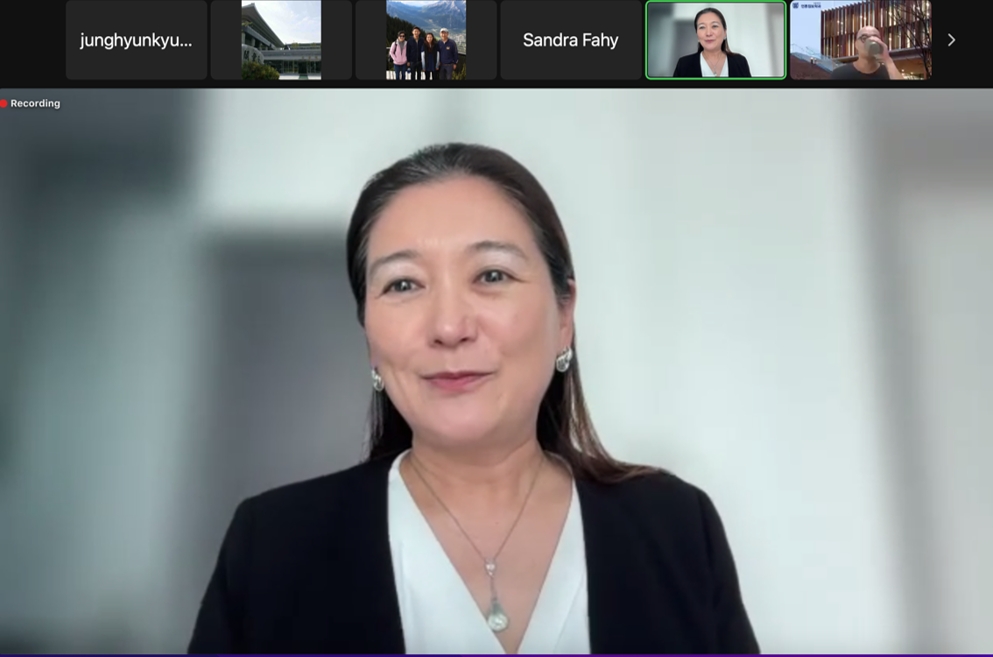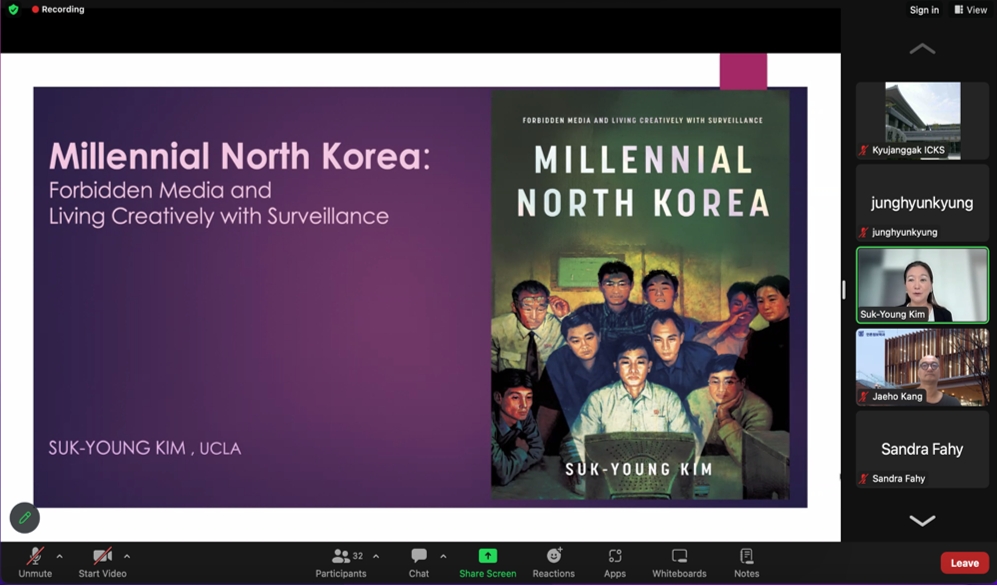In the past few weeks, the issue dominating the news cycles in South Korea has been the escalating tensions between North Korea and South Korea. Psychological warfare has been ongoing between the two Koreas, involving excrement-laden balloons from the North and propaganda broadcasts over loudspeakers at the border from the South. While inter-Korean conflict is a well-established fact to South Koreans, the reality of North Korean citizens remains largely shrouded in mystery. South Koreans rarely see North Korea in headlines other than those forewarning flare-ups in tension.

Professor Kim Suk-Yong

Professor Kim delivering her Book Talk
In a timely state of affairs, Seoul National University’s International Center for Korean Studies of Kyujanggak Institute hosted a Book Talk on June 10, introducing Kim Suk-Young’s upcoming book Millennial North Korea: Forbidden Media and Living Creatively with Surveillance. As an archival institution and academic research center that catalogs the past and present of the two Koreas, the Kyujanggak Institute for Korean Studies hosted the talk to shed some light on the day-to-day living of North Koreans. The talk was moderated by SNU Professor Kang Jaeho of the Communications Department, with Professor Sandra Fahy from Carleton University as the discussant. Kim Suk-Yong, the speaker and the author of the book, is a professor at UCLA with doctoral degrees in Interdisciplinary Theatre and Drama, and Slavic Language and Literature; she has published many works on body politics and transmedia. This Book Talk served as one of the first presentations Professor Kim gave after submitting her manuscript to publishers, acting as an explanatory lecture on the fundamental thesis of her book.
The book primarily emerged from Professor Kim’s desire to counter the perception of North Korea as an anachronistic, rigid nation. She argues that North Korea has undergone immense change, particularly with the rise of communication technology. Since the introduction of a 3G cell phone network in 2008, the number of registered cell phone users in North Korea has grown to 7 million by 2022. Though the North Korean government allowed the proliferation of cell phones to boost economic activities and facilitate surveillance programs, civilians have started using them differently in more creative manners.
Millennials were a crucial part of Professor Kim’s research. This generation witnessed the collapse of the central-state rationing system and had to navigate the growing semi-free market system slowly taking form in their society; their exposure to technology thus became crucial to navigating this transitional period. An important caveat Professor Kim mentions is that while a monolithic view of an entire generation can lead to precarious generalizations, a discussion of how North Korean citizens are diverse and creative in their living must begin with a conversation on generational constructs. She explains that when she uses the term “millennial,” she is not simply referring to a specific age group (those born between 1981 and 1996) but to those who subscribe to a performative identity involving a certain lifestyle and participation in social networks.
As part of her research, Professor Kim conducted in-depth interviews with twelve North Korean resettlers who discussed how new media technology has shaped their home country and how information from the outside flows in. These interviews revealed interesting insights into North Korean cell phones, like how they come preloaded with software apps and can be used to make domestic calls, purchase items online, order food delivery, and even use photo editing programs. More importantly, cell phones are used to consume unsanctioned South Korean pop culture. Such South Korean media can be obtained at jangmadang (North Korean markets) where they are sold under the guise of being proper North Korean media on SD cards. Cell phones can also be used to deliver information through the “cell phone kiss.” This system involves North Korean resettlers in South Korea contacting their families back home through brokers (one in North Korea and one in China), who physically meet and link their cell phones to transfer information. Due to cell phone surveillance, these calls must be under five minutes, but they are an important avenue for real-time information about South Korea to flow into North Korea. The embedded spyware on North Korean cell phones means that during phone calls, citizens must communicate creatively with secret codes and invent neologisms to evade draconian surveillance.
A survey of South Korean dramas that North Korean millennials watched revealed that the most popular ones are Boys Over Flowers, My Love from the Star, Autumn in My Heart, and Stairway to Heaven. These dramas are a source of fascination for North Koreans because they offer novelty, escapism, familiar culture, and serve as a preview to the cell phone technology that will later be adopted by North Korea. These dramas are also compelling because they contain familiar elements like an understanding of how security camera systems are used for surveillance, the existence of an unspoken strict economic caste system, and cell phones as mediators of identity.
To conclude, Professor Kim summarized that North Korea can be seen as an increasingly diversifying society, far from the monolithic entity conceived in public perception. In a nation where unsanctioned consumption of foreign media can lead to severe punishment, sharing risky content like South Korean pop culture must be carried out on the basis of trust and shared knowledge. The forbidden content creates a new layer of social networks that must be performed cogently which in turn leads to the emergence of a new group identity. Millennial North Koreans are thus risk-takers who creatively navigate between the state’s centralized governance and cell phone technology to live in a fractured society.
Through these insights, we gain a more empathic and conscientious understanding of North Korea that goes beyond mere headlines of conflict. For those interested in a deeper engagement with the lived experiences of North Koreans and North Korean millennials, the Kyujanggak Institute for Korean Studies is always open to inquiry.
Written by Hyun Kyung Jung, SNU English Editor, jhyunk@snu.ac.kr

